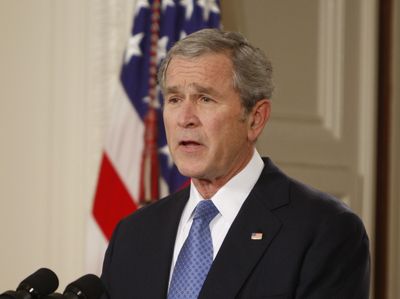Bush did what he ‘thought was right’

WASHINGTON – Thursday night, President Bush said goodbye.
Speaking for the last time to a nation he has led for eight years, he mixed his trademark confidence with a hint of contrition, acknowledging that he has “experienced setbacks” but emphasizing that he always acted in the “best interests” of the country.
Standing before television cameras in the East Room of the White House, Bush spoke to a national television audience before a group of invited guests that included dozens of people representing key moments in his presidency, including widows of victims of the Sept. 11, 2001, attacks and parents of troops killed in Iraq and Afghanistan. He boasted of preventing terrorist attacks, pushing education reform and promoting democracy abroad. His tenure, he said, “was a period of consequence, a time set apart.”
Yet the former Texas governor, known for his bluster and swagger, also struck a few notes of conciliation in his remarks, urging detractors to look to his good intentions and suggesting that history will deliver the final verdict on his leadership.
“There are things I would do differently if given the chance,” Bush said during his 13-minute speech. “Yet I have always acted with the best interests of our country in mind. I have followed my conscience and done what I thought was right.
“You may not agree with some tough decisions I have made,” he continued. “But I hope you can agree that I was willing to make the tough decisions.”
The speech marked Bush’s last scheduled public appearance until Tuesday, when he will welcome President-elect Barack Obama to the White House before heading to the Capitol and handing over the reins of power. Bush called the swearing-in of the first black president “a moment of hope and pride for our whole nation” and said Obama’s rise “reflects the enduring promise of our land.”
The address capped a two-month public relations effort by Bush, who saw his popularity reach record highs after the 2001 terrorist attacks before plunging to historic lows as the Iraq war dragged on, Hurricane Katrina struck and the nation’s economy crumbled. Although Bush’s approval numbers have improved slightly as he prepares to leave office, he remains one of the most consistently unpopular presidents since the advent of modern polling.
Bush, however, has said repeatedly that he does not pay attention to polls, and he appeared animated and in good spirits during Thursday night’s address. He cast himself in the familiar role of an assertive leader who was unafraid to make difficult, and often unpopular, decisions in troubled times. He also drew heavily on 9/11 and its aftermath in his comments and claimed credit for a lack of additional attacks on U.S. soil.
While “most Americans were able to return to life much as it had been before 9/11,” Bush said, “I never did.” He said he “vowed to do everything in my power to keep us safe” and suggested that the administration’s aggressive and controversial program of detention, aggressive interrogation and surveillance was central to keeping Americans safe. He also suggested that the war in Iraq was part of the fight against terrorism, a contention that remains a matter of sharp dispute.
“There is legitimate debate about many of these decisions,” Bush argued, echoing a common theme from recent months. “But there can be little debate about the results. America has gone more than seven years without another terrorist attack on our soil.”
Bush also defended his propensity to label the governments of some nations as “evil” and urged Americans to “maintain our moral clarity.”
“I have often spoken to you about good and evil,” he said. “This has made some uncomfortable. But good and evil are present in this world, and between the two there can be no compromise.”
Political adviser Ed Gillespie told reporters at the White House that the farewell message was intended as “an endpoint, a punctuation mark” on a series of speeches and interviews that Bush, Vice President Dick Cheney and other top officials have given in recent weeks.